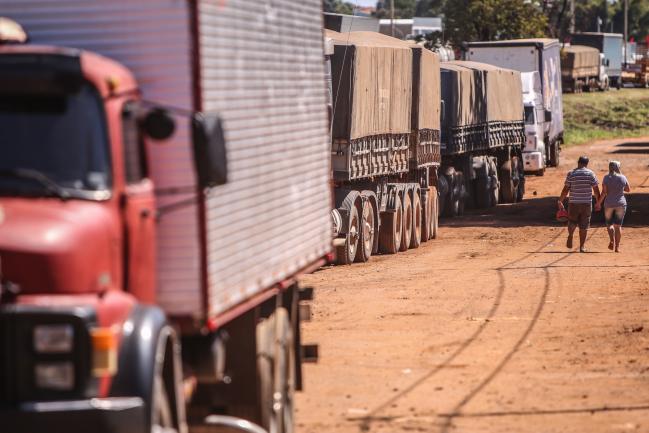(Bloomberg) -- Brazil’s government declared the end of a devastating truckers’ strike on several occasions over the past week. Yet much of Latin America’s largest economy remains strangled as protests continue for a ninth day.
The explanation for the prolonged chaos includes a weak and unpopular government in an election year. What started as a genuine movement by workers accustomed to spending many days away from home was eventually hijacked by political forces on the left and the right.
The strike continues because of the interest of "people who want to overthrow the government," said Jose da Fonseca Lopes, head of the largest truckers’ union.
On the left, the oil industry union FUP, which is backed by the Workers’ Party of jailed former President Luiz Inacio Lula da Silva, piggybacked on the truckers’ strike to announce its own work stoppage starting on Wednesday. Ciro Gomes, who hopes to replace Lula as the standard-bearer of the left, has argued that the strike shows the need for a heavier government hand in the economy.
Meanwhile voters and truckers on the far-right, some of whom sympathize with former Army captain and presidential candidate Jair Bolsonaro, have become more outspoken in their demand for military intervention, posting messages on WhatsApp and even staging separate protests. On Monday evening hundreds of them marched before Congress. One sign read: "We generals of the Army want the power."
In a bid to restore order, the government started arresting people who were blocking roads, Institutional Security Minister Sergio Etchegoyen, a retired general, told reporters on Tuesday. Yet a military intervention isn’t a solution, he added.
Centrist Defeat
The chaotic nature of the protest against market-friendly fuel price policies has pummeled chances of centrist, reform-minded candidates, argues political scientist Carlos Melo.
"The radicalization tends to favor the more extreme and rhetoric candidates," said Melo, who teaches at the Insper business school. "Candidates on the left and the right, more anti-establishment, anti-government, end up benefiting."
Bolsonaro, who has denied that Brazil’s 1964-85 military rule was a dictatorship but more recently has moderated his discourse, was eager to distance himself from the strike, particularly the more radical elements.
Endless Demands
Fueling the strike was the fact that the multiple leaders of the diverse movement, emboldened by their own success and a government caught off guard, kept throwing new demands on the negotiating table. After announcing a final deal on Monday afternoon, President Michel Temer was forced to meet with the Sao Paulo governor to deal with yet more truckers’ demands, Globo News reported on Tuesday. Truckers want to be pardoned for any tickets they may have gotten during the strike, price cuts to be applied at gas stations not the refinery, and better rates for shipping cargo.
Meanwhile consumers celebrate small improvements in the supply of food and fuel. In Brasilia, one shopper cheered as he was finally able to purchase eggs on a farmers’ market. A man at a petrol station filling his car smiled, saying he had waited only 2 hours compared with 4 hours on Saturday.
If all goes according to plan, the returning to normality could take between seven and 10 days, said Admiral Ademir Sobrinho, joint chief of staff of the armed forces.
That doesn’t take into account the massive blow to public coffers, slower economic growth projections and the risk of a domino effect with other unions seeking to make up for years of recession and austerity.
(Adds comment from institutional security minister in sixth paragraph.)
